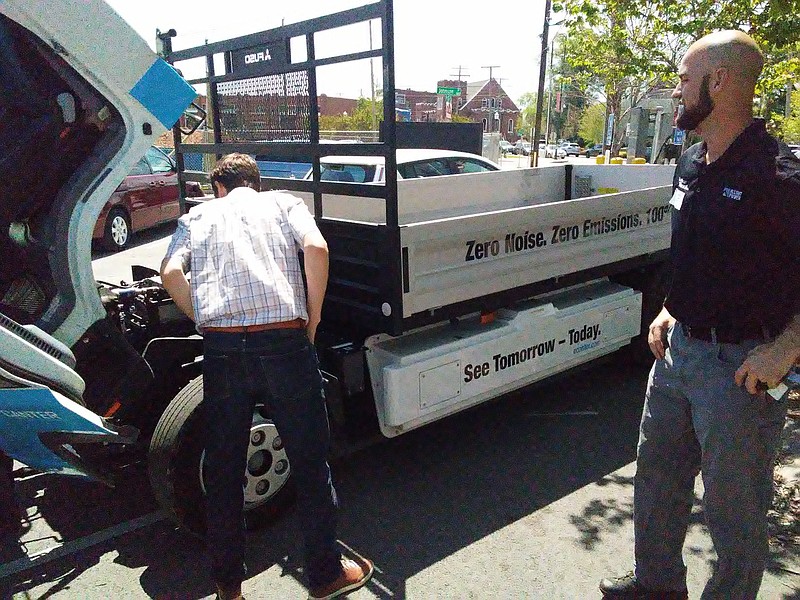Mike Holtzhower wears a black company work shirt that says "Southeast Diesel, Inc."
He'd like to add "Electric" in there, since Holtzhower hopes next year to introduce an all-electric work truck made by Mitsubishi Fuso Truck and Bus Corp. to the Chattanooga market.
"No one's done a production work truck that's 100 percent electric - this is the first one," said Holtzhower, who does truck marketing and servicing for Southeast Diesel Inc., a locally owned business founded in 1984 that services and sells work trucks.
Holtzhower showed off a prototype of the all-electric truck Thursday afternoon near Green Spaces, a a nonprofit organization at 63 E Main St. on Chattanooga's Southside, whose mission is to promote "sustainable living, working, and building in Chattanooga and the surrounding region."
The prototype electric truck was used for a year in Portugal, Holtzhower said, and was on loan for a few days in Chattanooga as part of a U.S. tour.
A batch of 50 production models of the truck will make it to the United States next year as part of a "soft launch" of the vehicle, Holtzhower said, and he hopes to snag 10 of them to lease in the Chattanooga area.
"I don't want them all going to Los Angeles or New York," he said.
Pros of the electric truck, which can carry about 9,000 pounds, include that it should cost 11 cents per mile to operate - about half as much as the 21 cents per mile to run a diesel truck, Holtzhower said.
Maintenance costs would be lower for the electric work truck, he said, since it won't need oil changes that can cost $200, each, for a diesel truck, it doesn't require the clean diesel additive that Southeast Diesel sells by the pallet, and it won't eat up brakes.
"The brakes are going to last four times as long, because it regenerates," Holtzhower said, referring to the "regenerative braking" in electric and hybrid vehicles that uses a generator to slow the vehicle - and generate electricity.
The electric truck has plenty of power, he said.
"It's more torque than a diesel," Holtzhower said. "It's got so much torque, and it's instant."
The downsides include that leasing the truck should cost about 10 percent more than a diesel truck - about $950 a month for the Mitsubishi Fuso. And the electric work truck only has a range of about 100 miles per charge.
But Holtzhower said that the 100-mile-per-charge range isn't a deal-breaker, since businesses that could strategically set up fast chargers are various locations. And "green" businesses, such as solar panel installers, might want to lease an electric truck since it's in keeping with their mission.
Holtzhower talked about the electric work truck at the Southside Council meeting, a Chattanooga Chamber of Commerce event, that was held at Green Spaces.
Michael Walton, executive director of Green Spaces, was enthusiastic about the electric work truck's potential.
"We certainly see that as a significant step toward the future of clean transportation," Walton said. "We've come a really long way in the car market, but there are no electric trucks available on the open market today."
Contact staff writer Tim Omarzu at tomarzu@timesfreepress.com or www.facebook.com/MeetsForBusiness or on Twitter @meetforbusiness or 423-757-6651.
